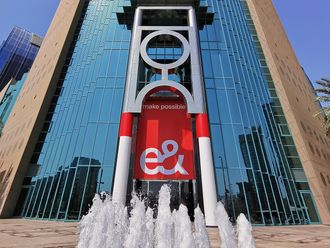Dubai:
Saudi Arabia’s Tadawul index fell the most in the region as it reopened after a week long holiday, playing a catch-up with the downward slide seen in global markets last week.
The Tadawul index was 1.46 per cent lower at 6,086.30, after falling from an intraday high of 6,176.53.
“It’s a catch-up. All the markets globally lost ground due to a shift in perception in monetary policy,” said Sanyalaksna Manibhandu, director Research, National Bank of Abu Dhabi Securities.
Most of the investors were disappointed with European Central Bank governor’s lack of insights on continuation of easy money policy, triggering speculation about the ability of central banks to support growth.
In the short term, traders in stocks in Saudi Arabia would be concerned about the crude prices, fiscal consolidation and slowdown in the economy.
Star performer
In the UAE, the star performer of the day was Shuaa Capital.
“Active traders went to smaller stocks, which might have a story to them,” Manibhandu said.
Shuaa Capital jumped more than 9 per cent in trade to close at Dh0.89. Earlier, Shuaa said Abu Dhabi Financial Group (ADFG) had reached an agreement to buy the 48.36 per cent stake of the investment bank held by Dubai Banking Group.
Among other stocks, Gulf Finance House, in which ADFG also has a stake, closed 1.96 per cent higher at Dh1.04. Amanat closed 0.92 per cent higher at Dh0.876.
“Today’s price action on higher volumes broke over the intraday resistance zone. The stock is hinting further recovery towards the previous high at Dh0.914 and later shall target Dh0.96 in the short term,” NBADS Research said in a note.
The Dubai Financial Market General Index closed 0.03 per cent higher at 3,483.32. The Abu Dhabi Securities Exchange General Index closed 0.29 per cent lower at 4,486.28. Elsewhere in the Gulf, Qatar exchange index closed 0.36 per cent higher at 10,572.45. Kuwait Stock Exchange index closed 0.06 per cent lower at 5,426.36.
Credit Suisse expects better performance in Gulf equities
Credit Suisse expects a better performance in Gulf equities supported by a more positive outlook on oil prices and stabilising earnings forecasts.
Valuations are reasonably attractive, being in line with the long-term average, Credit Suisse said in an emailed report.
GCC equities has been a worst performer globally, and has not participated in the strong emerging market recovery over the past few months.
“This is not so surprising given that oil prices remain well below levels needed for a fiscal budget break even and that subsidy reform has weighed significantly on growth,” Fahd Iqbal, Head of Middle East Research at Credit Suisse said.











